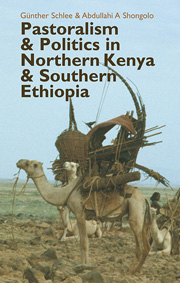Book contents
- Frontmatter
- Contents
- List of Maps and Figures
- List of Abbreviations
- Introduction
- 1 Moi Era Politics, Transnational Relations and the Territorialization of Ethnicity
- 2 The Post-Moi Period 2002–2007
- 3 Feedback and Cross-fertilization: The ‘Declaration of Indigenous Communities of Moyale District’
- 4 Some Comparative Perspectives, Conclusions and Recommendations
- References
- Index
- EASTERN AFRICAN STUDIES
Introduction
Published online by Cambridge University Press: 05 September 2013
- Frontmatter
- Contents
- List of Maps and Figures
- List of Abbreviations
- Introduction
- 1 Moi Era Politics, Transnational Relations and the Territorialization of Ethnicity
- 2 The Post-Moi Period 2002–2007
- 3 Feedback and Cross-fertilization: The ‘Declaration of Indigenous Communities of Moyale District’
- 4 Some Comparative Perspectives, Conclusions and Recommendations
- References
- Index
- EASTERN AFRICAN STUDIES
Summary
There is no need to worry about the future of pastoralism. Pastoralism came into existence thousands of years ago, not long after mixed agriculture from which it has derived as a form of specialization. It can be temporarily obstructed, oppressed, or abolished but it will always re-emerge. The reason for this is simple: about one third of the land surface of the world and two thirds of Africa (United Nations 1997) are arid or semi-arid and cannot be used for any other form of food production. Low rainfall and its erratic distribution will always require herd mobility. If the groups utilizing these areas now, the so-called ‘traditional’ pastoralists are exposed to political and economic conditions which reduce them to poverty and force them into sedentarization or if they are destroyed by military force, others will take over. ‘Modern’ pastoralists of urban or agricultural origins might play that role, assisted by satellites (remote sensing, GPS) and other modern communication technologies. The existing groups of pastoralists can be expropriated, marginalized, expelled, or decimated. But then non-pastoralists will become, as they have done again and again throughout history, the new pastoralists. The question is not whether also in the future there will be a mobile form of livestock production. There will. The question is to whom it will belong.
- Type
- Chapter
- Information
- Publisher: Boydell & BrewerPrint publication year: 2012



